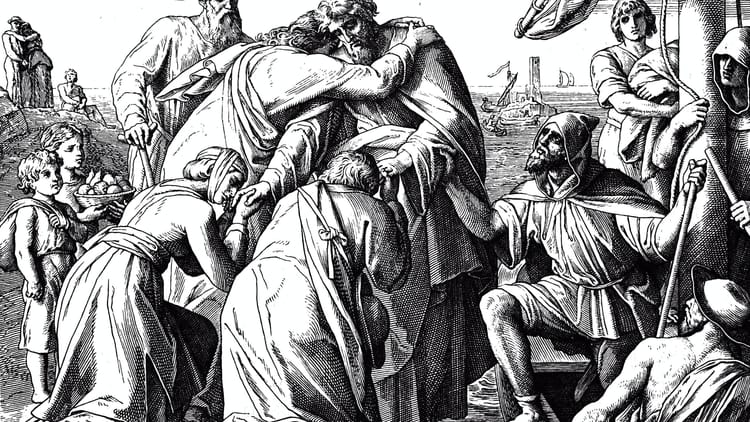What the Church Looks Like on Mission (Acts 8:1-25)

Big Idea: The church on mission often begins reluctantly, sometimes encounters surprising success, and is messy.
A few years ago, God unsettled my family. I’d been pastoring at a church in the inner suburbs of Toronto, but things began to unravel there a little.
To my surprise, we ended up moving into downtown Toronto into a young, professional, transient community. A friend of mine told me that it would be impossible to start a new church there. But we said, “Let’s see what happens,” and we just began to lay the groundwork for a new ministry in a secular part of the city.
And we faced some things we’d never faced before.
- We faced hostility. We faced complaints at community events because some people thought that a church had no place in the community. When we set up a social media account for our new church. Some guy started responding to our tweets with pretty hostile tweets about what he guessed we believed. I decided it would probably be best to meet him in person, so we met up at a Starbucks. My wife was terrified because that guy was not happy with me. It was my first time being criticized simply because of what he thought we must believe.
- We faced weird situations. We took part in a community event. Then I found out that someone was going to be doing a nude painting at that event. I thought, “That’s weird.” We wondered if we should pull out. Then we found out that by nude painting, they didn’t mean that someone would be painting a picture of a nude person. They would actually be painting the body of a man who was naked. Nothing in my ministry had prepared me for this.
- We faced confusion. We were asked questions I never thought we’d have to answer. One woman brought her dog to church. She came to me and said, “My dog is really into church. When I stand to sing, the dog stands. When I sit, the dog sits. When you preach, the dog falls asleep. Would it be okay if my dog took communion?”
We’d been unsettled in our previous church. God used this to drive us into a new community. And as we entered that new community, we faced some weird things we’d never faced before — hostility, strange situations, and confusion among people who claimed to be Christian. That’s what often happens as the gospel moves into new territory.
God’s Mission to Send and Save
As a church, you’re looking at the book of Acts right now. Acts is the history of the early church. The Book of Acts tells the story of how the message of Jesus’ death and resurrection went from a small group of people in Jerusalem to a big group of people all over the Roman Empire. How did that happen? Acts is going to tell us.
Today’s passage is about one of those inflection points in the book of Acts. Up until now, the church has begun to grow, but it’s all been about Jerusalem. But Jesus had said, “You will be my witnesses in Jerusalem, in all Judea and Samaria, and to the ends of the earth” (Acts 1:8). Jerusalem was good, but they had to take the gospel further.
The problem is that we don’t always want to take new ground for the gospel. We’re going to see some of the reasons in this passage. Taking the gospel to new places means you’re going to have to leave what’s comfortable for you, and also that you’re probably going to find much sympathy, and you’re probably going to find a lot of weird stuff.
A Portrait of the Church on Mission
I love this passage. I remember preaching on this passage early in my own experience of taking the gospel to a new area. I can relate to this passage.
This church gives us a portrait of the church on mission, and we can notice three things:
First: The church on mission often begins reluctantly.
Acts 8:1 says, “On that day a severe persecution broke out against the church in Jerusalem, and all except the apostles were scattered throughout the land of Judea and Samaria.”
This persecution was bad news. It already cost one man his life, and now the persecution was not just against a few isolated people but the entire church. Acts tells us that it’s a severe persecution, part of a systematic program to harass and oppress the church. It was against so many people for so much time that people began to leave Jerusalem and go to Judea and Samaria, taking the gospel with them.
And that’s just how God works. God can take even the worst circumstances and use them to advance his purposes. He takes something bad — persecution — and uses it to help the church take the most significant step forward so far in the mission of the church.
They go to Judea and Samaria. Samaritans were a people group that Jews hated and viewed as heretical, and the feeling was mutual. “God used persecution to move his people into the mission he had given them” (John Piper).
I don’t know how it will work in your life, but I know how it worked in mine. God had to break through my comfort and apathy to propel me to take the gospel to a new area. “Comfort and ease and affluence and prosperity and safety and freedom often cause a tremendous inertia in the church,” says John Piper. But God can take even negative things and push us into mission.
We’re often reluctant to move on mission. I think of a church not far from here that was praying about reaching their community. Somebody one day stood up as they were praying and said, “To be honest, I don’t really care about this community.” Others began to admit that too. They changed the focus of their prayers from praying for the community to praying for God’s heart for the community.
A church on mission often begins with reluctance, but God can overcome that. By his grace, he can disrupt our lives and push us on mission.
This may be very good news for some of you. Some of you may be experiencing a significant disruption in your life right now: a layoff, an unexpected move, or something else. It may be that God will use this disruption in your life just as he did in the book of Acts to advance his mission. God sometimes takes drastic action to move us out of our complacency and apathy, and he may be doing the same for you right now.
The church on mission often begins reluctantly. Here’s the second thing we learn in this passage.
Second: The church on mission sometimes encounters surprising success.
These believers began reluctantly. They didn’t go on Samaria on purpose. But they were obedient. As they went, they took the Spirit with them. And, perhaps to their surprise, they began to see God move.
So those who were scattered went on their way preaching the word. Philip went down to a city in Samaria and proclaimed the Messiah to them. The crowds were all paying attention to what Philip said, as they listened and saw the signs he was performing. For unclean spirits, crying out with a loud voice, came out of many who were possessed, and many who were paralyzed and lame were healed. So there was great joy in that city. (Acts 8:4-8)
Notice what happens here. Philip proclaimed the Messiah to them. This is the same message that is proclaimed from the pulpit here week after week: that God is holy, we are sinful, but that God sent his Son — the Messiah — to rescue us from our sins. He died in our place. He rose again to bring new life. We can come with empty hands of faith and trust him, and it changes everything.
And that’s what it did. People’s lives were changed in supernatural ways. I love what verse 8 says: “So there was great joy in that city.” The spread of the gospel is the spread of joy. The same message that changed lives then is the same message we have. It’s the same Savior we proclaim. The same Holy Spirit who was at work in that city of Samaria is at work here today. As the gospel is proclaimed, we can expect things to happen. The gospel always does something. It hardens hearts, it softens hearts. It always does something.
I’m calling this success. I know it’s not the only kind of success. I believe that success is simple obedience and trust in God regardless of the results. But it sure is nice when the gospel’s preached and people respond in surprising ways.
In verses 9 to 13, we read that a prominent occultist came to faith. I love how verse 13 reads: “Even Simon himself believed.” Have you ever seen that? Sometimes God moves in such a way that the least likely people come to faith in Jesus Christ.
The amazing thing is that the man God used is not an apostle. And yet God uses him to reach a completely new people group, one where God shows his power and lives are changed.
When we began the process of starting a new church in downtown Toronto, God gave us some early responses. It was so encouraging. I remember meeting a couple of community leaders and thinking, “It would be so cool to see them become part of the church!” Within a short time, they were. We watched people who’d never been to church before begin to hear about Jesus, and we began to see lives transformed. We saw God move. It was so encouraging. We’re still seeing that today — not all the time, but just enough to keep us encouraged.
But I would still sometimes complain about hard soil. I don’t know if you know that term. When pastors get discouraged, they start complaining that it’s hard soil — in other words, that it’s not a receptive area.
One day I go to a meeting. The guy who led the meeting that day had no idea that I had been complaining about hard soil. Here’s what he said. “I am so sick and tired of hearing people complain about hard soil. I wish I heard more people talking about the power of the gospel.” He was thinking about Romans 1:16: “For I am not ashamed of the gospel, because it is the power of God for salvation to everyone who believes, first to the Jew, and also to the Greek.”
What if we believed that the gospel is powerful? What if we believed that we don’t have to be professional clergy to take the gospel to new areas? What if we just believed that God is powerful enough to change lives, just because that’s what God does as they encounter the good news of Jesus Christ?
Two friends have been teaching me this recently. One of them just invites people recklessly to an evangelistic class we’re running, and so many of them come! Another said to me, “What if we stopped telling ourselves that it’s going to be hard, and just expected God will work?”
That’s what we see in this passage.
But here’s one more lesson we learn. The church on mission often begins reluctantly, but then can meet with surprising results.
Three: The church on mission is messy.
Remember Simon the occultist? He’s all in. We read in verse 13, “he followed Philip everywhere and was amazed as he observed the signs and great miracles that were being performed.” He was maybe a little too excited.
It wasn’t long before they encountered a problem with Simon. He begins to think that he can capitalize on the power of the Holy Spirit, almost like he wants to replace his occultic power with the power of the Spirit. He offers money to the apostles for the power of laying hands on people and giving them the Holy Spirit.
Why is this so serious? One commentator (Eckhard J. Schnabel) writes:
The attempt to buy (and sell) the gift of conveying the Spirit of God amounts to an attempt to manipulate God himself, which is not only impossible but a most serious sin. God’s good gifts can only be received with thankful hearts, not bought and sold and used for one’s own purposes.
And so Peter rebukes him.
But Peter told him, “May your silver be destroyed with you, because you thought you could obtain the gift of God with money! You have no part or share in this matter, because your heart is not right before God. Therefore repent of this wickedness of yours, and pray to the Lord that, if possible, your heart’s intent may be forgiven. For I see you are poisoned by bitterness and bound by wickedness.”
“Pray to the Lord for me,” Simon replied, “so that nothing you have said may happen to me.” (Acts 8:20-24)
Peter’s words in verse 20 could pretty literally be interpreted, “To hell with you and your money.” Peter didn’t mince any words in his reaction to this messy situation.
Was Simon’s original belief in the gospel genuine? Was his repentance genuine? Who knows? It’s quite probable that it wasn’t.
He showed no sign of repentance, or even of contrition. Instead of praying for forgiveness, as Peter had urged him to do (22), he felt so incapable of praying, or so distrustful of his own prayers, that he asked Peter to pray for him instead. What really concerned him was not that he might receive God’s pardon, but only that he might escape God’s judgment, with which Peter had threatened him. (John Stott)
Church tradition says that Simon went on to become a heretic and not a true Christian.
What we do know is that, as we take the gospel to people, we’ll encounter some very messy situations. We’re experiencing this right now in our church. The church on mission often begins reluctantly, sometimes encounters surprising success, and is messy.
And I love it. Because God invites all of us to join this mission. We’ve received the good news that Jesus has died in the place of sinful humanity and made us right with God, and then sent us on mission. He wants this church — he wants you — to join him on this mission. You may feel reluctant, but God can overcome that. Pray that he does. And then, as you start to live on mission, expect that you may see people respond to the gospel. And expect to see lots of messy situations.
It’s not easy. It’s not clean. But I can’t think of a better way to live.
Father, what you did in Samaria, do here. Disrupt us. Use us. Change lives as we tell others about Jesus. And yes, give us wisdom as we encounter messy situations.
And in the process, would we see the gospel advance for your glory so that more and more people come to know Jesus as Savior and King of the world. We pray this in Jesus’ name. Amen.





